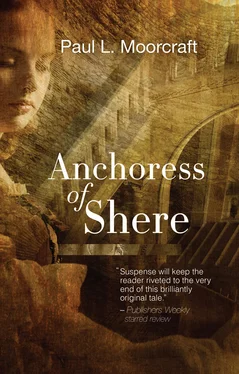Paul Moorcraft - The Anchoress of Shere
Здесь есть возможность читать онлайн «Paul Moorcraft - The Anchoress of Shere» весь текст электронной книги совершенно бесплатно (целиком полную версию без сокращений). В некоторых случаях можно слушать аудио, скачать через торрент в формате fb2 и присутствует краткое содержание. Жанр: Триллер, на английском языке. Описание произведения, (предисловие) а так же отзывы посетителей доступны на портале библиотеки ЛибКат.
- Название:The Anchoress of Shere
- Автор:
- Жанр:
- Год:неизвестен
- ISBN:нет данных
- Рейтинг книги:4 / 5. Голосов: 1
-
Избранное:Добавить в избранное
- Отзывы:
-
Ваша оценка:
- 80
- 1
- 2
- 3
- 4
- 5
The Anchoress of Shere: краткое содержание, описание и аннотация
Предлагаем к чтению аннотацию, описание, краткое содержание или предисловие (зависит от того, что написал сам автор книги «The Anchoress of Shere»). Если вы не нашли необходимую информацию о книге — напишите в комментариях, мы постараемся отыскать её.
The Anchoress of Shere — читать онлайн бесплатно полную книгу (весь текст) целиком
Ниже представлен текст книги, разбитый по страницам. Система сохранения места последней прочитанной страницы, позволяет с удобством читать онлайн бесплатно книгу «The Anchoress of Shere», без необходимости каждый раз заново искать на чём Вы остановились. Поставьте закладку, и сможете в любой момент перейти на страницу, на которой закончили чтение.
Интервал:
Закладка:
“That is now the finest spire in England, for the size of it,” Father Peter said, proud of his church and also calm in the knowledge that, at least, very little of the building funds had gone into his own pocket.
“Should be the fairest in the land, the time that has passed with the buildin’ of it,” Christine said with a smile, the first outward smile since that awful night. She felt at peace and knew her mind-the vision of the Cross had strengthened her will as well as her faith.
At the south porch, Father Peter explained the finer points of the late Norman decoration, bolstered with marble shafts from Petworth. After pushing open the heavy oak door, studded with brass, they passed the treasury coffer donated by Sir Richard, after Pope Innocent III had ordered each church in Christendom to place a chest for coin and gifts to support the Crusades. Near the confessional bench and screen stood the font. Christine stared at the marble with its stern central stem, angle shafts and foliated capitals. She knew no child of hers would be blessed there, and yet felt no regret.
Sitting upon a very low bench on one side of a simple carved wooden screen, her long glistening hair dangled nearly to the floor; half-nervously, with both hands, she flicked up the hair on the crown of her head, pushing aside the fringe over her forehead. Composing herself before declaring her sins to her priest, Christine fluently confessed to vanity and pride. And she expressed contrition at having hurt her innocent and loving husband-to-be. Above all, she confessed to rage and to a desire for revenge against the cruel and hypocritical Sir Richard.
“For all the wrongs he has done to you, I cannot say how Sir Richard has confessed to me,” the priest said with heavy resignation in his voice. “But he will atone or face the hounds of Hell and the fires of eternity. And spending his money on adorning our church is no atonement to me; no, it is almost blasphemy…but the church needs his help, for all that I say.”
“Father, I know that God will judge his evil, but I know also that Sir Richard’s foul impurity has taught me to be pure…for all time. I have told you something of my showing of the Cross, our Lord and our Holy Mother, such rich blessings for one as lowly as me; there is so much more…but I cannot, dare not, use my blundering tongue to speak of what belongs solely to God. But I can say, as God is my witness, that I wish to be closer to Him, perhaps-if He thinks me befittin’-in holy orders, but I do not wish to be sent away from here. In this church I am safe from Sir Richard, and others like him-if there be such other monsters in our shire. I want to be with God alone, not with other penitents seeking His guidance.” With a last spurt of emotion, she ended her utterly heartfelt speech with a plea: “Although I am unlettered, Father, I beg you to teach me.”
Father Peter was moved almost to tears. “Truly, I will aid you in all I can,” he said, his voice thick with remorse. “It is but a portion of the penance I owe to you and to God. To be God’s daughter in full vows is a purchase of paradise.”
And so it was. Her father eventually came to understand the girl’s desire to become a nun; it was a high calling, especially for someone from a simple family, but only Father Peter could comprehend her gradual insistence on becoming an anchoress, a solitary, rather than a member of an established holy order. William did, however, persuade Father Peter to counsel Simon, her once-betrothed, and Christine, both together. The priest, although he felt it to be a thankless task, summoned them to his humble cottage.
Simon arrived very early and, since there was only one chair in the room, he sat on his haunches, fidgeting, and blinking in the thick smoke of the wood fire. The priest tried to comfort him, but the conversation faltered in the face of Simon’s truculent silence. An hour later, Christine walked very slowly into the priest’s home. At once the lover jumped up and pleaded with all his heart: “A nun, perhaps, I can believe, but a recluse entombed, all that beauty, that energy, encased in cold grey stone!” Normally Simon was a man of few and simple words, but passion empowered his speech. “Delay your plans for a year or so…please think of me-us, then, the little ones we oft talked about.”
Christine’s face grew red and tears welled up in her eyes, but she took command of her emotions from the past. Her voice was firm: “Simon, I do still love you…but I must beseech you to find another woman. Many others there be far more suited for the unborn children I see in your eyes. I beg you to avoid my sight; please spare me the hurt. You shall be for ever my only earthly love.” Her voice started to break. “I ask Father Peter to request you to go in God’s peace. Please, please…I cannot bear the pain…” And she banished him from her presence, though never from her thoughts.
In contrast, Christine’s mother and her sister Margaret soon perceived the power of her vision. Although Margaret affected to be the most worldly of the family, she loved her sister and accepted with her whole heart that Christine had a different calling. Finally, so did her father, but her decision cut deep into his belief of what his family should be. He cared not what the village said of the strange honour bestowed upon the home, and he despaired of the lonely years his first-born would endure.
Christine spent more and more time with her priest, who himself struggled to read, comprehend, learn and then explain the Ancrene Riwle, the guidance for a solitary life of contemplation. Initially, he described her future life as climbing four rungs of a ladder. The first involved lessons on the Holy Scriptures and the writings of the holy fathers, beginning with the lives of the saints. Then she would be taught to meditate on these lessons. Prayer would be enhanced by this lengthy meditation. And the final rung was contemplation, a state to which the priest had never himself aspired. He felt acutely that he lacked what St. Gregory called the “art of arts”-that of guiding souls. He knew he could barely guide himself; Christine would eventually need to be instructed by a much higher authority than his own.
They discussed the means by which one enters a state of true contemplation, the highest form of union with God that the soul on earth can attain, the wondrous and mysterious act that involved the total occupation of the mind and the will with the thought of God. Christine had to substitute the love of self with the love of God, only then was union between God and her soul possible in this mortal life. Father Peter explained all this as he tried earnestly to grapple with the most powerful but enigmatic tenet of Catholic theology.
An anchoress, he insisted, must return Godwards truly to fulfil the purpose of her creation. She might achieve mystical ecstasy only by contemplating the three levels of the knowledge of God, via His creation of nature, by reading His scriptures, and by understanding God as Himself, in His manhood and Godhead.
The priest warned Christine that the path would be very hard and that Christ was a jealous master. And there would be many difficulties and temptations beyond her studies and the conflicts of her inner life. A woman searching for the truth on her own was anathema to the Church hierarchy, because men ruled the Church, men decided on the paths to salvation. Individual pursuit of God undermined the very foundations of Christendom, the centralised control of Rome. Female saints there were, he said, but usually they had been canonised long after their martyrdom. Respected nuns, usually of noble birth, there were also, but Christine refused to consider a communal route to God.
In the beginning the priest tried to overcome the girl’s self-abasement about her lack of schooling, but soon her quick mind outpaced her tutor’s. A little defensively, he parried her more penetrating questions by asserting the authority of more learned men over her intuitive insights.
Читать дальшеИнтервал:
Закладка:
Похожие книги на «The Anchoress of Shere»
Представляем Вашему вниманию похожие книги на «The Anchoress of Shere» списком для выбора. Мы отобрали схожую по названию и смыслу литературу в надежде предоставить читателям больше вариантов отыскать новые, интересные, ещё непрочитанные произведения.
Обсуждение, отзывы о книге «The Anchoress of Shere» и просто собственные мнения читателей. Оставьте ваши комментарии, напишите, что Вы думаете о произведении, его смысле или главных героях. Укажите что конкретно понравилось, а что нет, и почему Вы так считаете.












